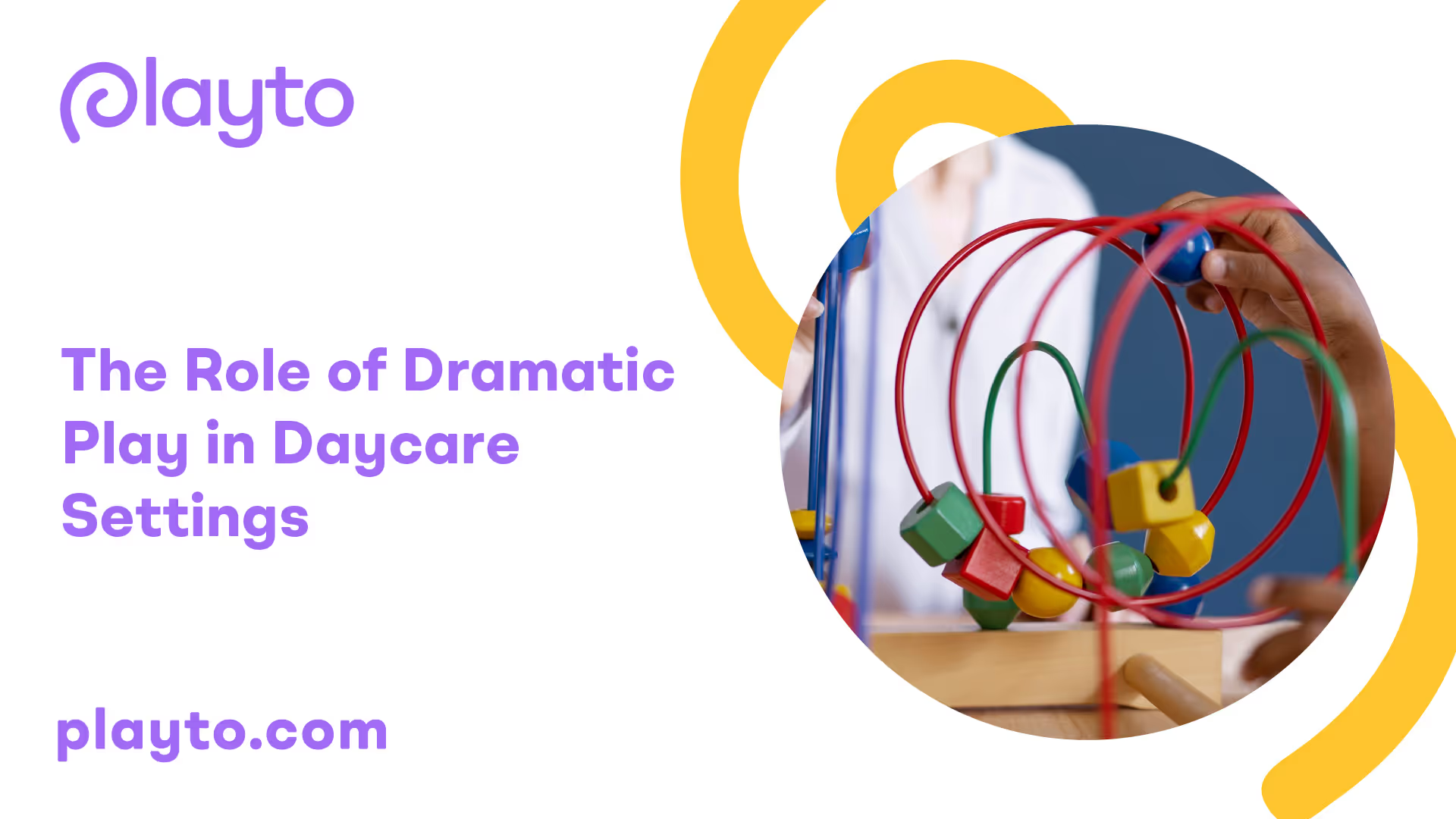The Importance of Dramatic Play in Daycare
Dramatic play plays a significant role in daycare settings, offering countless benefits for children's development. By engaging in imaginative and pretend play, children have the opportunity to explore themselves, express their thoughts and ideas, and better understand their own feelings. Let's delve into the benefits of dramatic play and the different types it encompasses.

Benefits of Dramatic Play
Dramatic play supports various aspects of a child's growth, making it a valuable activity from toddlerhood to preschool and beyond. Some of the benefits include:
- Creativity and Self-Expression: Through dramatic play, children can unleash their imaginations, creating new worlds and scenarios. This fosters creativity and allows for self-expression.
- Real-Life Skill Development: Pretend play often imitates real-life situations, enabling children to practice and develop essential skills such as problem-solving, communication, and decision-making.
- Social Skills Development: Dramatic play provides a safe environment for children to practice their emotional, physical, verbal, and social skills. They learn to negotiate, cooperate, and navigate group dynamics, fostering empathy and understanding [2].
Types of Dramatic Play
There are two main types of dramatic play that children engage in: structured dramatic play and unstructured dramatic play.
- Structured Dramatic Play: In structured dramatic play, children participate in specific roles and scenarios. For example, they might engage in a pretend doctor's office or act out a storybook. This type of play provides guidance and helps children develop their imaginative and storytelling abilities.
- Unstructured Dramatic Play: Unstructured dramatic play, on the other hand, allows children to freely explore and create their own scenarios. They have the freedom to imagine and act out various roles and situations. This type of play encourages creativity and problem-solving skills as children navigate their own imaginative worlds.
By incorporating both structured and unstructured dramatic play in daycare settings, educators and parents can provide children with a well-rounded play experience, stimulating their cognitive, social, and emotional growth.
Dramatic play is an invaluable tool for children's development, fostering creativity, self-expression, real-life skill development, and social skills. It offers a safe and engaging way for children to learn and explore the world around them. To learn more about the role of different activities in daycare programs, check out our articles on the role of music in daycare programs and the role of physical activity in daycare programs.
Encouraging Dramatic Play in Daycare
Encouraging and supporting dramatic play in daycare settings is crucial for children's development and overall well-being. Educators and parents play a vital role in fostering this type of play and creating an environment that promotes imaginative exploration. By providing opportunities for role-playing, using props and costumes, and creating themed play areas, children can fully engage in dramatic play and reap its numerous benefits.

Role of Educators and Parents
Educators and parents play a collaborative role in encouraging dramatic play in children. By working together, they can provide a supportive environment that nurtures a child's self-expression, creativity, and social development. Here are some ways educators and parents can support and encourage dramatic play:
- Provide opportunities for role-playing: Setting aside dedicated time for dramatic play allows children to explore various roles and scenarios. Educators can incorporate dramatic play into lesson plans, while parents can encourage pretend play at home. This can involve providing props, costumes, and playsets that reflect different occupations, cultures, and interests.
- Engage in play with the child: Educators and parents can actively participate in dramatic play, taking on roles alongside the children. This involvement not only enhances the child's play experience but also strengthens the bond between the child and the adult, fostering trust and communication.
- Ask open-ended questions: Encourage children to think critically and expand their imagination by asking open-ended questions during dramatic play. This helps them develop problem-solving skills and enhances their cognitive abilities.
- Observe and provide guidance: While allowing children to lead the play, educators and parents should observe and provide guidance when necessary. They can offer suggestions, ask thought-provoking questions, and help children navigate social interactions during play.
By actively participating and supporting children's dramatic play, educators and parents can create an environment that encourages creativity, self-expression, and social development.
Creating Themed Play Areas
To enhance dramatic play experiences, daycare settings can create themed play areas that stimulate children's imaginations and provide a context for their play. Themed play areas can be designed to represent various settings, such as a grocery store, a doctor's office, a restaurant, or a post office. By integrating props, costumes, and play materials relevant to the theme, children can immerse themselves fully in the world of make-believe.
To make the most of themed play areas, daycare settings can:
- Rotate play materials: Regularly rotating play materials keeps the play area fresh and exciting, capturing the children's interest and encouraging their engagement. Items such as kitchen sets, dolls, dress-up clothes, play money, and writing implements can be included in the rotation, ensuring a variety of play experiences.
- Promote inclusivity: It is essential to provide diversity in play materials, representing various cultures, countries, occupations, and disabilities. This inclusivity helps create an environment that respects and celebrates differences. By incorporating a wide range of props and costumes, children learn about diversity, empathy, and acceptance.
By creating themed play areas and ensuring diversity in play materials, daycare settings can foster a rich and inclusive environment for young learners, promoting their cognitive, social, and emotional development.
Dramatic play offers children a platform to explore, imagine, and express themselves. By actively encouraging and supporting dramatic play, educators and parents can provide children with valuable opportunities for growth, creativity, and social interaction.
Implementing Dramatic Play Scenarios
To fully harness the benefits of dramatic play in daycare settings, it's important to implement engaging and varied scenarios. This section will explore two key aspects of implementing dramatic play scenarios: rotating play materials and creating an inclusive environment for learners.

Rotating Play Materials
To keep children engaged and excited about dramatic play, it's essential to rotate play materials regularly. This ensures that the play area remains fresh and stimulating for young learners [3]. Consider incorporating a range of play materials, such as kitchen sets, dolls, dress-up clothes, play money, and writing implements, to encourage imaginative play and creativity.
By periodically changing the play materials, children are exposed to new scenarios and challenges, sparking their curiosity and fostering a sense of exploration. This rotation also allows children to explore different roles and scenarios, enhancing their problem-solving and critical thinking skills.
Inclusive Environment for Learners
In daycare settings, it is crucial to create an inclusive environment that celebrates diversity and represents various cultures, countries, occupations, and disabilities. By providing a wide range of dramatic play materials that reflect the diverse world we live in, children learn to appreciate and respect different perspectives [3].
Consider incorporating dolls or figures that represent different ethnicities, including items that represent various occupations and cultures. This inclusive approach allows children to explore and understand different roles and backgrounds, promoting empathy and understanding.
Additionally, themed dramatic play scenarios can be created based on classroom themes or seasons. For example, setting up a doctor's office during a community helpers theme or a hot chocolate stand during winter can enhance the learning experience for children. These themed play areas provide opportunities for children to engage in role-play, problem-solving, and creative expression.
To further enhance the learning experience, encourage children to share their own cultural experiences and traditions during dramatic play. This fosters a sense of belonging and allows children to develop a deeper understanding and appreciation for their own heritage and that of their peers.
By implementing rotating play materials and creating an inclusive environment, daycare settings can maximize the benefits of dramatic play. Through these strategies, children have the opportunity to engage in imaginative play, develop social skills, and expand their understanding of the world around them.
Learning Through Dramatic Play
Dramatic play in daycare settings not only provides children with a fun and imaginative experience, but it also plays a crucial role in their overall development. Through dramatic play, children have the opportunity to enhance their social and cognitive skills, as well as develop their literacy skills and emotional expression.
Social and Cognitive Development
Engaging in dramatic play allows children to practice and refine their social and cognitive skills. As they participate in pretend scenarios and interact with their peers, they learn to navigate social situations, negotiate roles, and cooperate with others. This type of play provides a safe environment for children to practice emotional, physical, verbal, and social skills.
In addition, dramatic play helps children develop empathy and understanding as they take on different roles and perspectives. They learn to consider the thoughts and feelings of others, which contributes to their social awareness and emotional intelligence. By engaging in group play, children also learn to communicate effectively, resolve conflicts, and navigate group dynamics.
Literacy Skills and Emotional Expression
Dramatic play offers children an opportunity to explore and express their emotions in a safe and controlled environment. It serves as a powerful tool for emotional development, allowing children to process, understand, and express their emotions in different and healthy ways. Through pretend play, children can take on various roles and experiment with different emotions, helping them develop emotional resilience and self-regulation skills. This type of play also serves as an outlet for children to handle stress, anxiety, and other strong emotions they may experience.
Furthermore, dramatic play promotes literacy skills and language development. As children engage in imaginative play, they have the opportunity to expand their vocabulary, improve sentence structure, and enhance both verbal and non-verbal communication skills. Through role-playing and storytelling, children practice articulating their thoughts, listening to others, and engaging in dialogue within various imaginative scenarios. This helps to foster their communication abilities and prepares them for future language and literacy development [2].
By incorporating dramatic play into daycare settings, educators and parents can create a rich learning environment that supports children's social and cognitive development. This type of play not only provides opportunities for children to engage with their peers but also promotes their literacy skills and emotional expression. Through dramatic play, children can develop essential life skills while enjoying a world of imagination and creativity.
Role of Adults in Dramatic Play
Adults play a crucial role in facilitating and supporting dramatic play in daycare settings. While child-led routines are important for fostering independence and creativity, adults can still provide guidance and create an environment conducive to learning and development.
Teaching Expectations
One of the roles of adults in dramatic play is to teach expectations. By setting clear guidelines and boundaries, adults help children understand the appropriate behaviors and interactions during playtime. This includes teaching them how to take turns, share resources, and resolve conflicts peacefully. By modeling positive social skills and providing gentle guidance when needed, adults help children develop important social-emotional skills that will benefit them both in and outside the daycare setting.
Setting the Stage for Learning
In addition to teaching expectations, adults play a crucial role in setting the stage for learning during dramatic play. They can create an environment that stimulates imagination and creativity by providing a variety of props, costumes, and play materials. These resources allow children to fully immerse themselves in their pretend play scenarios, fostering their cognitive and language development. By introducing new themes and ideas, adults can expand children's knowledge and encourage them to explore different roles and perspectives.
Collaboration between parents and daycare educators is essential in supporting a child's dramatic play efforts. By working together, both sides of the child's developmental support system can align their approaches and strategies to foster the child's self-expression and creativity. This collaboration ensures that children receive consistent support and encouragement, promoting the continuity of their learning experiences between home and school.
By actively participating in and supporting children's dramatic play, adults help create a rich and engaging learning environment. They provide scaffolding and guidance, allowing children to explore new ideas, build problem-solving skills, and develop their social and emotional competence. Through their role as facilitators and mentors, adults contribute to the overall growth and development of children in daycare settings.
Enhancing Child Development Through Pretend Play
Pretend play, also known as dramatic play, plays a vital role in enhancing child development in daycare settings. Engaging in pretend play allows children to develop essential cognitive and social skills while providing an emotional outlet for self-expression. Let's explore the ways in which pretend play enhances child development.
Cognitive and Social Skills
Pretend play is crucial in child development as it helps children learn skills like symbolic understanding, theory of mind, and counterfactual reasoning, contributing to their cognitive and social abilities. Through pretend play scenarios, children have the opportunity to take on different roles, imagine different scenarios, and solve problems creatively. This type of play helps develop their imagination, creativity, and critical thinking skills.
During pretend play, children often engage in cooperative play, taking on roles and interacting with peers. This fosters social interaction, cooperation, and negotiation skills. They learn to communicate effectively, practice empathy, and take turns, all while collaborating with others to create imaginative storylines and scenarios. Engaging in pretend play with peers also encourages the development of their social and emotional intelligence.
Emotional Outlet and Self-Expression
Pretend play provides children with a safe space to express and explore their emotions. It allows them to act out different roles and situations, enabling them to make sense of their experiences and emotions. Through imaginative play, children can express their fears, hopes, dreams, and aspirations. This emotional outlet helps them develop emotional intelligence and self-regulation skills.
By taking on different roles and experimenting with various emotions, children gain a deeper understanding of themselves and others. They learn to empathize, understand different perspectives, and develop compassion. Pretend play allows children to explore and process complex emotions in a supportive and nurturing environment.
To enhance child development through pretend play, parents, caregivers, and educators play a crucial role. They can encourage and support children's pretend play activities by providing them with a variety of props, costumes, and play materials that stimulate their imagination. By engaging with children during pretend play, adults can model appropriate behavior, teach problem-solving skills, and scaffold their learning experiences.
By recognizing the importance of pretend play in child development and creating an environment that encourages and supports it, daycare settings can foster the cognitive, social, and emotional growth of children. Pretend play is not just a form of entertainment, but a valuable tool for learning and development that contributes to the overall well-being of children in daycare settings.
